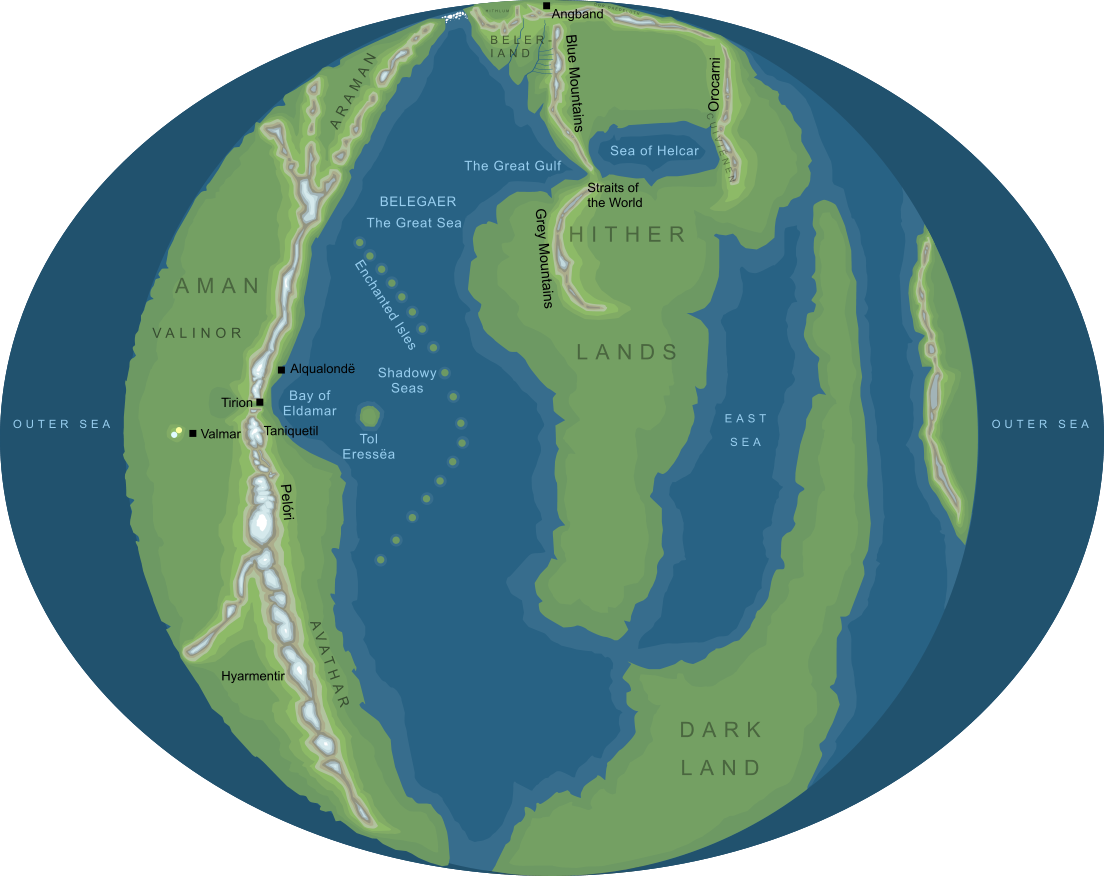Dates
Created by the Music of the Ainur in ancient times; prophesied to be remade after the Last Battle
Location
Race
Created by Ilúvatar and the AinurPronunciation
a'rrda (the 'r' sound should be pronounced - 'rr' is used here to emphasise this)
Meaning
Other names
Indexes:
About this entry:
- Updated 4 April 2008
- This entry is complete
|
Arda
The world

The shape of Arda before the end of the First Age (somewhat conjectural) 1
The shape of Arda before the end of the First Age (somewhat conjectural) 1In the language of the Elder Days, 'Arda' signified the world and all that is in it. Arda was created through the Music of the Ainur to be a dwelling place for the Children of Ilúvatar (that is, Elves and Men).
Originally a flat world, the continents shown in the map above were surrounded by a mighty ocean, Ekkaia or the Encircling Sea, and separated by Belegaer, called the Great Sea. In the First Age, the regions to the north and west of Middle-earth were occupied by the country of Beleriand, but this was destroyed during the tumults of the War of Wrath.
In the Second Age, the isle of Númenor was raised in the Great Sea for the Edain to dwell on. This island existed through most of the Second Age, but was destroyed in the Downfall of Númenor as a result of the pride of the Númenórean people in defying the Ban of the Valar and sailing to Aman in the West.
After the Downfall, the shape of Arda was changed, and it was made 'bent' (or 'round' as we should say in modern terms). Aman was taken out of the world, and could only be reached by the Elves, following the straight road that was granted to them. As Aman was taken away from Arda, new lands and continents were created. From the late Second Age onwards, the world began to take the shape that we know today.
Notes
1 |
The map of Arda shown here is based on Maps IV and (especially) V reproduced by Christopher Tolkien in volume IV of The History of Middle-earth. These maps belong to an early phase of Tolkien's mythology, and in a few cases the nomenclature of the originals has been updated (for example, Map V refers to the region known in the published Silmarillion as Avathar by its older name Arvalin).
The main point of conjecture on the map is the placing of Ered Luin and the Orocarni. In fact, Map V does not name these mountain ranges, but Map IV shows ranges in these locations, and labels them the 'Blue Mountains' and 'Red Mountains' respectively. Equally, the range stretching southwest from Helcar into the (unnamed) southern continent might possibly correspond to an older conception of a range known as the Grey Mountains (quite unrelated to the northern range of the same name).
It's important to remember that the original maps on which this one is based predate the stories of the Third Age, and aren't entirely compatible with the later geography of Middle-earth. In particular, the relatively small northern continent would probably need to be rather larger than is shown here to accommodate all the lands that Tolkien later devised.
|
See also...
Aman, Amon Uilos, Ancient Darkness, Arda Marred, Astaldo, Balrogs, Change of the World, Children of Earth, Children of Eru, Children of the Sun, Circles of the World, Cloud of Ungoliant, Culúrien, Dagor Dagorath, Dark Land, [See the full list...]Dark Lord, Day of Doom, Deeps of Time, Dwarves, Eärendil, Ekkaia, Elder Children of Ilúvatar, Elder King, Eldest, Eldest Days, Elemmírë, Elu Thingol, Elven-folk, Elvish World, Empty Lands, Encircling Sea, Endor, Eru, Eruhíni, Fangorn Forest, First War, Flame Imperishable, Flower of Silver, Gates of Morning, Gift of Men, Great Gulf, Great Lake, Great Music, Great Sea of the West, Great Water, Halls of Awaiting, Halls of Waiting, High King of Arda, High Ones of Arda, Hill of Ilmarin, Holy Ones, Horses, Icebay of Forochel, Imperishable Flame, Inner Seas, King of Arda, King of the Elves, Kingdom of Arda, Kingdom of Earth, Lamps of the Valar, Last Battle, Later Ages, Light in the West, Little Kingdom, Living Creatures, Lómelindi, Long Night, Longbeards, Lord of Men, Lord of the West, Lord of Waters, Lords of the Valar, Mahal, Maiar, Maiar of the Sea, Malinalda, Manwë Súlimo, Marrer of Middle-earth, Marring of Arda, Masters of Spirits, Men, Menel, Menelvagor, Morgoth, Mortals, Mountain Wall, Mountains of Iron, Mountains of the East, Nether Darkness, Nine Ringwraiths, Nothing, Olórin, Outer Ocean, Outer Sea, Outer Void, Outside, Over-heaven, Peace of Arda, Power of the Black Land, Power of the North, Powers of Arda, Powers of the World, Queens of the Valar, Rána, Ring of Doom, Rulers of Arda, Salmar, Second Age, Second Prophecy of Mandos, Second Spring of Arda, Self-cursed, Silmarillion, Spirits, Spring of Arda, Star-watcher, Strangers, Taniquetil, The Abyss, The Dead, The Deathless, The Firmament, The Mariner, The One, The Seer, The Star, The Strong, The Valiant, The Weaver, The West, The White, Three Jewels, Timeless Halls, Timeless Halls, Timeless Halls, Timeless Void, Tom Bombadil, Tulkas, Two Kindreds, Ulmo, Ulumúri, Valar, Valmar, Veil of Arda, Walls of Night, Walls of the World, Water of Awakening, West Wind, Wild Men, Wilwarin, World’s End, Years of the Sun, Younger Children of Ilúvatar
Indexes:
About this entry:
- Updated 4 April 2008
- This entry is complete
For acknowledgements and references, see the Disclaimer & Bibliography page.
Original content © copyright Mark Fisher 1997-2000, 2008. All rights reserved. For conditions of reuse, see the Site FAQ.
Website services kindly sponsored by myDISCprofile, the free online personality test.Explore the benefits of using a personality profile to discover yourself and make the most of your career.
|

